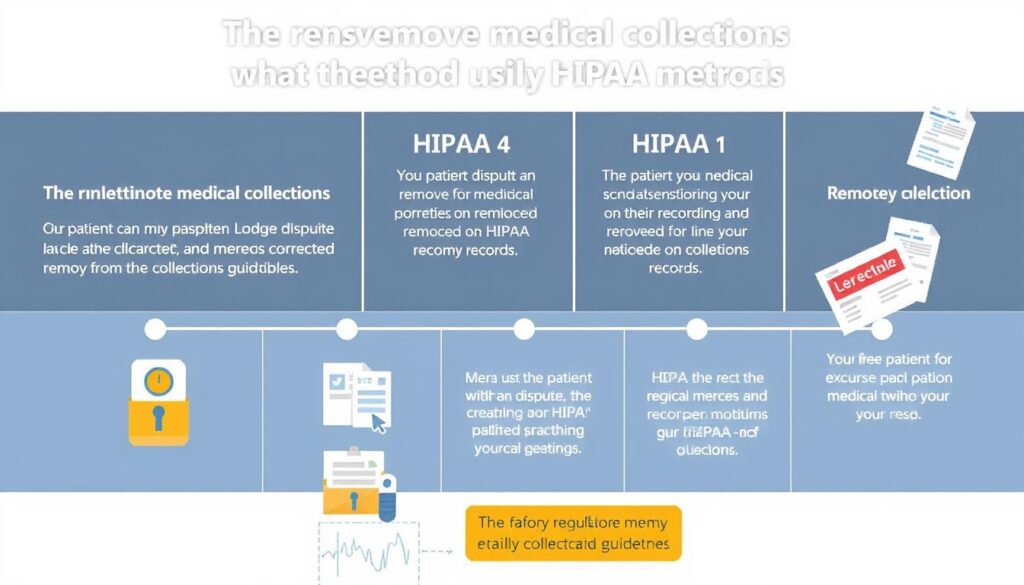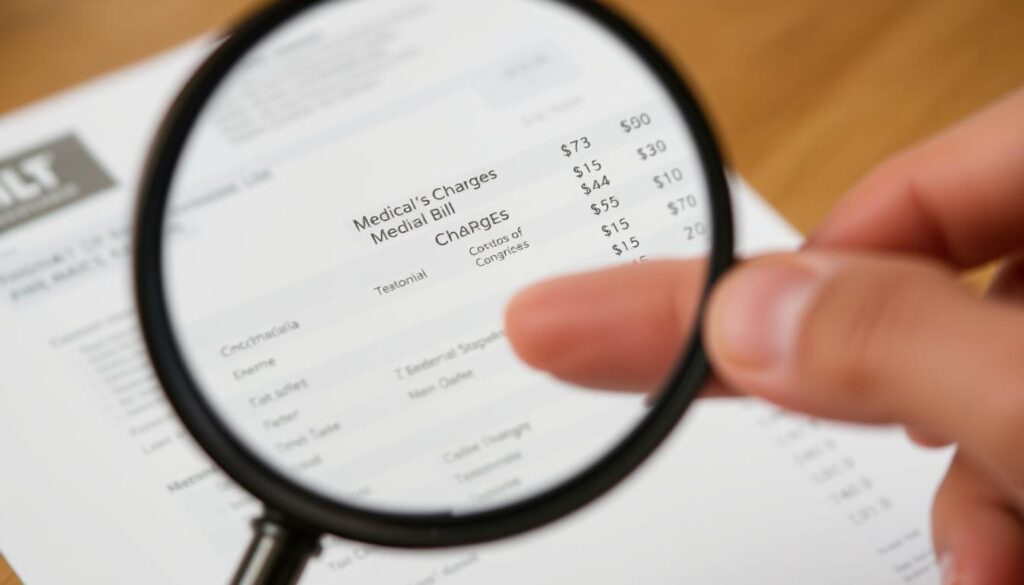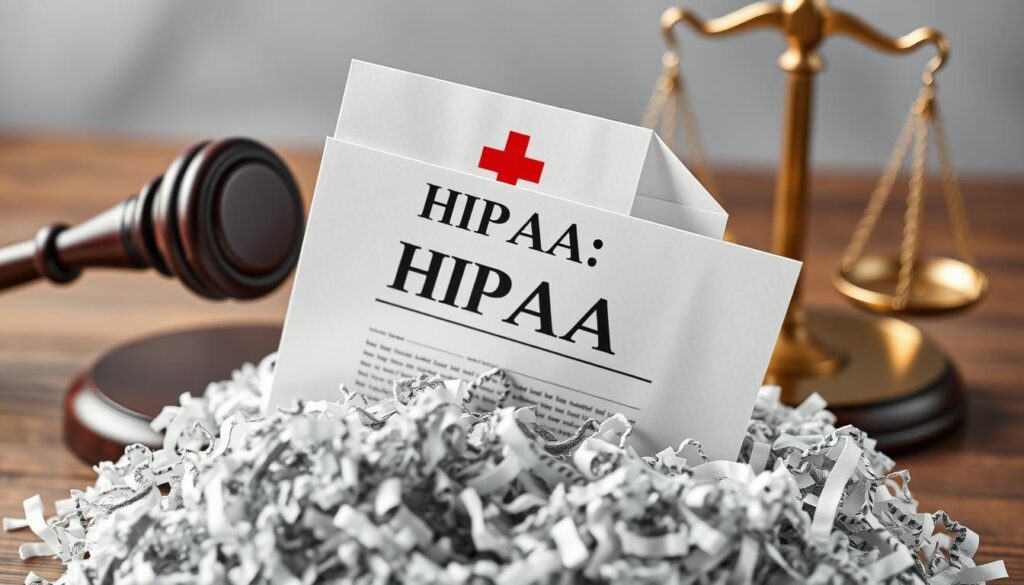Medical debt weighs heavily on many Americans. The HIPAA method offers a powerful solution to remove medical collections from credit reports. This approach protects your financial health and boosts your credit score.
To use the HIPAA method, start by monitoring your credit report. Stay informed about your record and act when necessary. The FCRA and HIPAA provide guidelines for reporting medical debts.
These laws offer opportunities to address inaccuracies. Understanding HIPAA regulations empowers you to control your financial future.
This guide will show you how to remove medical collections. You’ll learn steps to improve your credit standing. By following these steps, you can take charge of your financial health.
Key Takeaways
- The HIPAA method is effective for removing medical collections from credit reports
- Regular credit report monitoring is essential for managing medical debt
- HIPAA regulations offer protection against unfair medical debt reporting
- Understanding FCRA and HIPAA can help in disputing inaccurate medical collections
- Proper use of the HIPAA method can lead to improved credit scores
Understanding Medical Debt in the United States
Medical debt is a growing problem for many Americans. It’s crucial to examine the impact of healthcare-related financial burdens. These issues affect individuals and families in various ways.
Prevalence of medical debt
Medical debt statistics reveal a troubling trend. One in three U.S. adults faces unpaid healthcare bills. This makes medical debt the largest source of collections debt nationwide.
Impact on credit scores
Unpaid medical bills can significantly lower credit scores. This affects a person’s ability to secure loans or find housing. It can also impact insurance rates and employment opportunities.
Recent changes in medical debt reporting
Recent debt reporting changes offer some relief. In 2022, most medical debt was removed from credit reports. Starting 2023, medical debt under $500 won’t appear on credit reports.
These changes will remove two-thirds of medical debt from credit reports. This marks a significant shift in how medical debt affects financial health.
| Year | Change in Debt Reporting | Impact |
|---|---|---|
| 2022 | Most medical debt removed from credit reports | Improved credit scores for many |
| 2023 | Medical debt under $500 not reported | Further relief for those with small medical debts |
These developments are crucial for managing your financial well-being. Stay informed about how healthcare costs can affect your credit score. Understanding these changes can help you make better financial decisions.
The Importance of Monitoring Your Credit Report

Your credit report is crucial for your financial health. It contains information used to calculate your FICO score. This score determines your creditworthiness and affects many financial aspects of your life.
Regular credit checks help you spot potential issues early. You can identify unauthorized accounts and detect errors in reported information. It also allows you to track your progress in improving your score.
Monitoring your credit can help you recognize signs of identity theft. This proactive approach protects your financial well-being. It enables you to address problems before they severely impact your credit.
- Identify unauthorized accounts or inquiries
- Detect errors in reported information
- Track your progress in improving your credit score
- Recognize signs of identity theft early
You can get your credit report from various sources. Banks, credit counselors, and paid monitoring services offer access to this information. Some services provide real-time alerts for changes to your report.
“Your credit report is a reflection of your financial history. Monitoring it regularly is like giving your finances a health check-up.”
Staying informed about your credit status helps you make better financial choices. It allows you to act quickly if issues arise. A good credit score can lead to better loan terms and lower interest rates.
Obtaining Your Free Credit Reports
Keeping tabs on your credit is vital. You can get free credit reports from Equifax, Experian, and TransUnion. These reports offer a snapshot of your financial health.
AnnualCreditReport.com
AnnualCreditReport.com is the simplest way to get your free credit reports. This official site lets you request reports from all three major bureaus. It’s fast, secure, and costs nothing.
Phone and Mail Options
You can also request your free credit reports by phone or mail. Call 1-877-322-8228 to order by phone. For mail requests, download the form from AnnualCreditReport.com.
Send the form to Annual Credit Report Request Service, P.O. Box 105281, Atlanta, GA 30348-5281.
What to Look for in Your Credit Report
When reviewing your credit reports, check these key areas:
- Personal information accuracy
- Accounts you don’t recognize
- Late payments or collections
- Medical debts under $500
- Old or paid-off medical debts
Regular checks of your free credit reports help spot errors early. You can catch potential fraud and dispute issues quickly. This practice keeps your credit history accurate and up-to-date.
Identifying Medical Collections on Your Credit Report
Spotting medical collections on your credit report is crucial for addressing debt. These entries often appear as transferred debt. A thorough credit report analysis helps pinpoint these items accurately.
When reviewing your report, look for terms like “medical” or healthcare provider names. Debt collectors may use generic names, so examine unfamiliar entries carefully. Debt verification helps understand the origin of each collection.
To tackle medical collections, trace them back to their source. Get the original itemized medical bill with CPT codes. These codes verify the services provided and their costs.
“Proper documentation is your best defense against inaccurate medical collections.”
Healthcare providers must keep records of your medical bills by law. If you face resistance when asking for documents, don’t give up. You may need to escalate your request or file a HIPAA complaint.
By mastering medical collection identification, you can challenge inaccuracies effectively. This skill helps you work towards improving your credit score.
The HIPAA Method: A Powerful Tool for Debt Removal
HIPAA rules offer a strong way to tackle medical debt reporting problems. This method uses specific rules to challenge wrong information on your credit report. It’s a powerful strategy for dealing with medical debt issues.
Understanding HIPAA Regulations
HIPAA sets strict rules for handling medical info. It allows limited sharing of patient data for payment reasons, including credit reporting. This balance between privacy and money matters is crucial.
HIPAA’s Role in Medical Debt Reporting
HIPAA lets debt collectors report some details to credit agencies. This includes your name, address, birth date, and social security number. It also covers payment history and account number.
The law limits what can be shared. It protects sensitive health information from being exposed.
Using HIPAA for Debt Removal
The HIPAA method turns these rules into debt removal tactics. By checking your credit report, you can find possible HIPAA violations. If a collector shares too much, you can dispute the entry.
This approach can help remove wrong or improperly reported medical debts. It can improve your credit report and overall financial health.
“HIPAA provides a unique angle for addressing medical debt issues on credit reports. It’s a tool every consumer should know about.”
The HIPAA method can be a game-changer for managing your credit score. It shows how knowing rules can help in the complex world of medical debt reporting.
Steps to Remove Medical Collections Using the HIPAA Method
The HIPAA dispute process helps remove medical debt. Follow these steps to challenge incorrect medical collections and boost your credit report.

Ask your healthcare provider for itemized medical bills with CPT codes. These detailed bills help identify errors or overcharges. Review each item carefully for accuracy.
If you find discrepancies, gather evidence and prepare a written dispute. Use HIPAA rules to ask for proof of proper handling of your health information.
- Draft a formal letter to the credit bureaus
- Include copies of itemized bills and supporting documents
- Cite relevant HIPAA provisions in your dispute
- Request removal of the medical collection if HIPAA violations are found
Stay persistent during the credit report dispute process. If your first attempt fails, don’t give up. You might need to contact the healthcare provider directly.
Consider seeking help from a consumer protection attorney. Following these steps and using the HIPAA method can improve your chances of removing medical debt.
Obtaining Itemized Medical Bills with CPT Codes
Managing healthcare costs requires understanding your medical bills. Itemized bills with CPT codes break down services in detail. These bills help spot errors and ensure fair charging practices.
Importance of CPT Codes
CPT codes are standard descriptions for medical procedures. They create a universal language for describing healthcare services. These codes help verify charge accuracy and compare prices across providers.
How to Request Itemized Bills
Contact your healthcare provider’s billing department for an itemized bill. Ask for a detailed statement that includes CPT codes for each service. Many providers offer online portals for easy access to this information.
- Call the billing department
- Use online patient portals
- Submit a written request
Dealing with Uncooperative Providers
Escalate your request if a provider refuses to give an itemized bill. You have the right to this information under HIPAA regulations. As a last resort, file a complaint with the Department of Health and Human Services.
| Action | Timeframe | Next Step |
|---|---|---|
| Initial request | 1-2 weeks | Follow up call |
| Written request | 2-4 weeks | Escalate to management |
| Management escalation | 1-2 weeks | File HIPAA complaint |
Itemized bills with CPT codes help you review healthcare charges effectively. This knowledge is crucial for disputing mistakes. It can also help reduce your medical debt.
Analyzing and Disputing Medical Bills

Careful analysis of medical bills can help you spot errors and dispute unfair charges. Check your itemized bills for procedures you didn’t receive or incorrect services. Compare charges with Medicare prices to identify potential overcharging.
If you find issues, dispute them with the medical institution. This could lead to reduced or erased bills. Review your insurance coverage to ensure proper benefit application.
Keep these points in mind when reviewing your medical bills:
- Check for duplicate charges
- Verify correct patient information
- Ensure proper coding of procedures
- Look for unexplained fees or surcharges
Document all communications during disputes. Keep detailed records of phone calls, emails, and letters with healthcare providers and insurance companies.
| Common Billing Errors | Action Steps |
|---|---|
| Incorrect patient information | Contact billing department immediately |
| Duplicate charges | Request itemized bill and highlight duplicates |
| Upcoding (billing for more expensive procedures) | Compare with your medical records and dispute |
| Incorrect insurance information | Provide correct insurance details |
Thorough analysis and disputing of medical bill errors can save you money. It also protects your credit score from unfair medical collections.
Negotiating with Healthcare Providers and Debt Collectors
Medical debt negotiation can be a powerful tool. It might help you secure better terms or reduce the amount owed. Let’s explore some effective strategies.
Payment Plan Options
Many healthcare providers offer payment plans to manage medical debt. These plans spread the cost over time, making it more manageable. Be honest about your finances when discussing payment plans.
Propose a monthly amount you can realistically afford. This approach helps create a sustainable solution for both parties.
Settlement Offers
Debt settlement involves negotiating to pay less than the full amount owed. This strategy works well, especially with older debts. Try offering a lump sum payment of 30-50% of the total debt.
Creditors often prefer getting some payment rather than none at all. This can work in your favor during negotiations.
Financial Assistance Programs
Many hospitals offer financial assistance programs for patients struggling with medical bills. These programs may provide discounts or even forgive the debt based on your income. Don’t be shy about asking for these options.
| Negotiation Strategy | Potential Benefit | Considerations |
|---|---|---|
| Payment Plans | Spread cost over time | Ensure monthly payments are affordable |
| Debt Settlement | Reduce total amount owed | May impact credit score |
| Financial Assistance | Possible debt forgiveness | Income-based eligibility |
Avoid using credit cards to pay medical bills. This turns medical debt into consumer debt, which has fewer protections. Stay patient and persistent in your negotiations.
With effort, you can often find a solution that works for both you and your healthcare provider. Keep exploring options until you reach a satisfactory agreement.
Medical Collections Removal HIPAA Method: Legal Considerations
The HIPAA method for removing medical collections involves complex legal issues. HIPAA protects patient privacy while allowing necessary debt reporting. Medical debt laws guide how these debts can be reported and collected.
Credit reporting agencies must follow strict rules for medical information. Furnishers of medical debt data must register with these agencies. This ensures accountability and protects consumer rights.

The Fair Credit Reporting Act allows reporting of medical debts with restrictions. To protect privacy, medical debt information must be coded. This coding system maintains confidentiality while allowing necessary financial reporting.
Understanding the reporting timeline for medical debts is crucial. The seven-year reporting period starts from the date of delinquency. This can greatly impact how long a medical debt affects your credit report.
| Legal Aspect | Requirement |
|---|---|
| HIPAA Compliance | Protection of patient privacy |
| FCRA Regulations | Allows medical debt reporting with restrictions |
| Information Furnishers | Must register with credit reporting agencies |
| Debt Information | Must be coded to protect privacy |
| Reporting Period | Seven years from date of delinquency |
HIPAA allows limited disclosure for debt collection purposes. Only the minimal necessary information can be shared. This balances the need for collection with privacy rights.
Alternative Strategies for Removing Medical Collections
The HIPAA method is powerful, but other strategies can help remove medical collections from your credit report. These approaches include simple disputes and complex negotiations.
Disputing errors on your credit report is an effective tactic. Review your report carefully and challenge any inaccuracies you find. This can lead to the removal of incorrect medical collections.
Consider a goodwill deletion if the debt is valid. Write a letter explaining your situation and request they remove the negative mark. This works best if you’ve paid the debt and have a good payment history.
Negotiating a pay for delete agreement is another option. You agree to pay the debt in exchange for removing the collection. Get this agreement in writing before making any payments.
Bringing the balance below $500 can be beneficial for smaller debts. Many credit scoring models now ignore medical collections under this threshold.
- Appeal insurance decisions if coverage was wrongly denied
- Explore financial assistance programs offered by healthcare providers
- Consider professional credit repair services, but be cautious of upfront fees
Improving your credit takes time and effort. Stay persistent and patient as you work to remove medical collections. Your efforts will pay off in the long run.
Conclusion
Medical debt and credit scores can be daunting. But you can take control with the right tools. The HIPAA method is a powerful way to address medical collections.
Effective debt management starts with knowing your rights. Ask for itemized bills and dispute errors. Negotiate with healthcare providers when possible. Monitor your credit regularly to spot issues early.
Apply these strategies to improve your credit report. Stay informed about changes in medical debt reporting. Your efforts can lead to better financial health. Take charge of your medical debt today.
FAQ
What is the prevalence of medical debt in the United States?
How does medical debt impact credit scores?
What recent changes have been made to medical debt reporting?
Why is it important to monitor your credit report?
How can I obtain my free annual credit reports?
What should I look for when reviewing my credit report?
How can I identify medical collections on my credit report?
What is the HIPAA method, and how can it help with medical debt removal?
Why are CPT codes important for medical debt removal?
How can I analyze and dispute medical bills?
What options are available for negotiating with healthcare providers and debt collectors?
What legal considerations are involved in the HIPAA method?
What are some alternative strategies for removing medical collections?
Source Links
- How To Remove Medical Collections From Your Credit Report – https://crushmedicaldebt.com/how-to-remove-medical-collections-credit-report/
- MEDICAL DEBT COLLECTION HIPAA & FCRA COMPLIANCE – https://www.thefaircapital.com/post/hipaa-fcra
- 7 Ways to Remove Medical Debt From Your Credit Report – GoodRx – https://www.goodrx.com/healthcare-access/medical-debt/remove-medical-debt-from-credit-report

